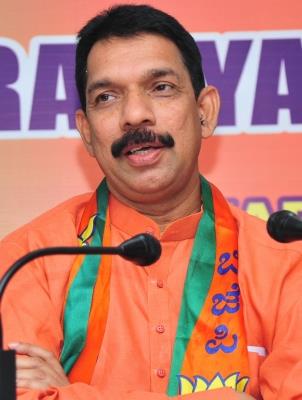(MENAFN- IANS) By Niranjanaradhya V.P.The controversial statement by Karnataka BJP President Nalin Kumar Kateel to send the descendants of Tipu Sultan to the jungles is highly derogatory and negates the very principles of citizenship provided by the Constitution of India.
Article 5 clearly states that citizenship is conferred upon all those persons who have their domicile in the Indian territory. Kateel also said that they being devotees of Lord Ram and Hanuman have the right to live in the fertile land, while the followers and descendants of Tipu have no rights.
The statement made by Kateel has two major implications. One, the followers of Tipu, whether they are Hindus or Muslims, are not eligible to live in Karnataka. Second, the kith and kin of the Tippu family whom he called as descendants should be sent back to their home. Unfortunately, he forgot to tell which home?
Kateel being a Member of Parliament needs to abide by the Constitution and its core values.
The Constitution also lays down certain fundamental duties to its citizens. Kateel also being a citizen has certain fundamental duties such as cherish and follow the noble ideals that inspired the national struggle for freedom; uphold and protect the sovereignty, unity and integrity of India; promote harmony and the spirit of common brotherhood among all the people of India transcending religious, linguistic and regional or sectional diversitie; to renounce practices derogatory to the dignity of women; and value and preserve the rich heritage of the country's composite culture abide.
If we examine the controversial statement made by Kateel in the context of above mentioned constitutional values, he not only violated the Constitution but also failed to discharge his constitutionally bounded duties as a Citizen.
Firstly, the statement is very derogatory, objectionable and an attack on the very social and cultural fabric of the Nation. Who is Kateel to declare that this is the land of Ram and Hanuman Bhakts when the Constitutions say it is the land of all Indians.
Further, Article 15 of the Constitution of India forbids discrimination on grounds only of religion, race, caste, sex, or place of birth. It applies Article 14's general principle of equality in specific situations by forbidding classifications made on protected grounds.
Kateel is not above the constitution to make such derogatory statements. It's completely baseless and highly objectionable. Being a Member of Parliament who has taken oath in the name of the Constitution, he violated the core values of the Constitution for which he deserves legal action. The people against whom he made such a derogatory statement should file a complaint against him seeking legal action.
If not, it is time for the Constitutional bodies such as the Election Commission and the National Human Rights Commission to register suo moto cases against an individual for assaulting the dignity of a particular community. Using religion and caste to provoke people on communal lines and spreading hatred day in and day out is a criminal offence.
Second, his (their) effort to misinterpret history has been known for many years. The attempt to distort the history to suit their interest is essentially for a political mileage keeping an eye on the forthcoming Assembly elections. It is not a surprise.
They have been doing it time and again when an election comes. It is a good tool to polarize people in terms of caste, religion and god. It is time for the people of the state to say it aloud that history is not an arbitrary narrative where myth can override the facts and they will not be carried away by such attempts by the communal forces.
The only way to snub and discourage these kinds of anti-human and religious fundamentalist tendencies for the sake of power is to raise public voice against such divisive forces. People should publicly condemn and shame such individuals and groups for using such narratives to divide people on the communal lines.
They should reiterate that international Human Right legal instruments on Civil and Political Rights and also the nation state constitutions establish that the authority to govern shall be based on the will of the people as expressed in periodic, free and fair elections.
(Dr Niranjanaradhya V.P. is Fellow and Programme Head, Universalisation of Education, at the National Law School of India University, Bengaluru. The views expressed are personal)
--IANS
mka/arm




















Comments
No comment